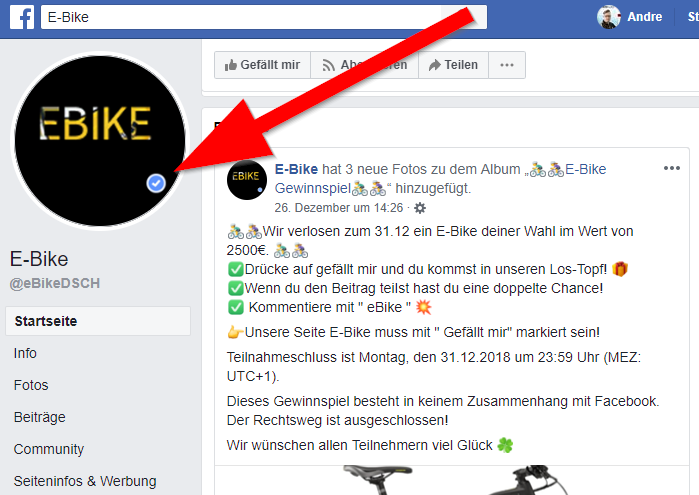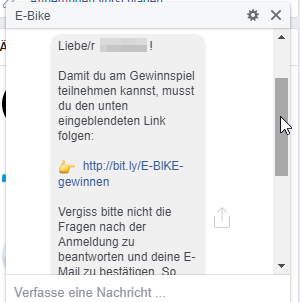There is a lot of cheating and lying!
Note: We have checked the Facebook competition below. Since this does not meet the criteria of the Facebook competition guidelines, it was classified as negative.
Fake competitions on Facebook are a nuisance. The number of fake competitions has increased significantly, especially since Facebook restricted the reach of pages. One can only assume that the mass occurrence of fake competitions is intended to compensate for a lack of reach.
And of course, all of these fakes also involve a fair amount of trickery, such as inventing verifications:
Screenshot of the current fake competition:

This is how it all works:
This game is also all about achieving a certain level of virality. Participants should like, share and comment on the post, as well as like the entire Facebook page. This is of course to spread this game as widely as possible. This is the first step in this classic 3-step competition, which we bait .
The central element at this point, however, is the comment that you should write under the game:
Interestingly, it plays a role in this competition which comment you leave. After leaving the comment “eBike”, you will be contacted via Messsenger. Of course, this is an automatically generated message that all commenters receive.
This message represents the second step, we call this type of step “the bridge”. This bridge represents the transition between the viral bait competition and the actual outcome.

This step 3 is identical in almost all games: You leave the bridge via a link that contains an affiliate code that belongs to a commission program. This is an affiliate whose content, if possible, correlates with the fake competition taking place in the bridge. We call this final link the exit. Under false pretenses you are now supposed to confirm this affiliate and thus release your own data for sale (“Please don’t forget […] to confirm your email”).
Note: The exit itself, i.e. the affiliates that are linked to, is not illegal! These are business models in which the respective provider of such programs compensates its sales partners through commissions. These sales partners are recognized by the provider through an identification code, so that every newly registered participant in the affiliate competition can also be assigned to the sales partner.
By the way, the person who designs the bridge freely decides which partner program he uses as an exit. We also often find systems that read the participant's origin and device information and thus direct them specifically to different commission programs. Therefore, you can never say clearly which commission program will ultimately be used; in the worst case, you will end up with dubious WAP billing stories or opaque subscription services.
... the fake competition on Facebook!
Take a real or fictional occasion and tell the user that there is something great to be won on the occasion of these great events.
The criteria for participation are quickly listed:
- Leave a Comment
- split
- like
- send personal message
Sometimes a deadline for participation is added, but the competitions are usually deleted by the operator before this deadline.
To ensure that there are no actual winners, the site owner should be contacted via personal message.
If the fake is successful, a new competition with a different prize will be created within a very short time. It doesn't matter whether you were able to win a car and then a dream house... The main thing is that users interact or follow a link that actually has completely different purposes.
“But if I play along, it won’t hurt anyone!”
True. Only yourself by showing your entire circle of friends and acquaintances on Facebook how gullible you are . You also show this to the creator of the page, who will be very interested in luring you with further competitions in the future in order to get more data from you. Because data brings money. And pages with a lot of likes and shares sell well.
“How am I supposed to know when a competition is real?”
We have a very simple checklist for this. If several or even all of the points on this list apply, you should stay away!
- Either a well-known brand, a well-known company is represented or an imaginary name is used
- Users are forced to like and share, which is the case here
- there is no (credible) imprint
- no conditions of participation exist
- no contact option
- no correct company (imprint) available
- The site has only existed for a short time, which is also the case here.
- no winners will be announced
- Prizes are provided by sponsors who “do not wish to be named”
- The prizes are advertised with copied images from the Internet
- For well-known companies, look for the blue verification check mark that is often present behind the page name in the cover photo
Report fake competitions to us!
Notes:
1) This content reflects the current state of affairs at the time of publication. The reproduction of individual images, screenshots, embeds or video sequences serves to discuss the topic. 2) Individual contributions were created through the use of machine assistance and were carefully checked by the Mimikama editorial team before publication. ( Reason )

